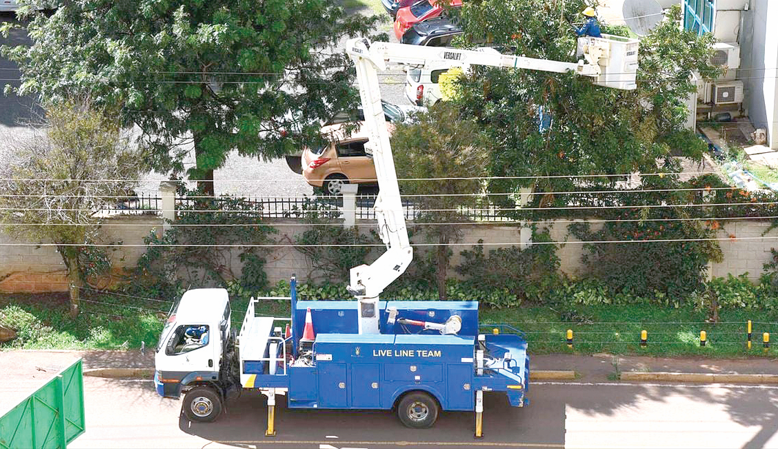Kenya Power on verge of collapse, says chief auditor

For the seven years running, Kenya Power has been operating at a loss and is on the verge of collapsing, Auditor General Nancy Gathungu has warned in her latest report.
In the audit summary for the year ending June 30, 2023, the company recorded a staggering Sh4.43 billion loss before tax.
The company’s current liabilities of Sh132.3 billion far exceed its current Sh81 billion assets by a whopping Sh51 billion as at June 30, 2023.
Reads the report: “The Company has remained in a negative working capital position for the seventh consecutive year.
Gathungu said past initiatives by the Board of Directors and management to improve the financial results of the company have not yielded fruits.
“These initiatives appear not to have yielded the intended results as at 30 June 2023. This condition along with many other matters indicates the existence of material uncertainty that may cast significant doubt on the company’ ability to continue as a going concern,” the report says.
In the report tabled at the National Assembly, Gathungu also reveals that the foreign exchange rate fluctuation impact for the company in the financial year 2022/2023 is Sh23 billion.
Power purchase
She says the company has been heavily affected by forex fluctuations owing to its payments of Power Purchase and Forex denominated loans due to a combined outstanding foreign currency obligation of USD 1 billion consisting of 70 per cent forex denominated debt and 30 per cent Power Purchase obligations.
She says the company should review its approach to power purchase contracting to mitigate against the significant foreign exchange exposure given that its entire revenue is in local currency.
This, she said, should include engaging existing power generators for sustainable currency related solutions that will resolve the accumulation of overdue obligations.
Reads the report: “The Company currently bears the difference between the actual forex rate used for payments and the Central Bank of Kenya (CBK) mean rate used by the regulator for pass through costs. There is no forex compensation mechanism to ensure that the market rate applied at the time of making payments is mitigated against the impact of the forex rate fluctuation.”
While comparing the cost of Power Purchase between Kenya Electricity Generating Company (Kengen) and Independent Power Producers (IPPS), Gathungu revealed that Kengen supplied a total of 8,027 gigawatt hours being 60 per cent of the total power purchased while the IPPS supplied the remaining 5,263 GWH being 40 per cent.
She, however, noted that the total cost of power purchased from Kengen was Sh54.2 billion equivalent to 35 per cent compared to power purchase cost of Sh98.4 billion from IPPS equivalent to 65 per cent.
Reads the report: “Over the years, there has been a disparity in the cost of power procured from Kenya Electricity Generating Company PLC (Kengen) and the independent Power Producers (IPPs).”
Gathungu also raises concerns over long outstanding receivables from other government entities amounting to Sh27.8 billion.
Of the money, receivables amounting to Sh26.9 billion relate to a debt due from Rural Electrification Scheme (RES) which the company administers on behalf of the government.
Media campaign
Included in the figure is another Sh154.7 million due from the Ministry of Energy and Petroleum, Kengen , Geothermal Development Company (GDC), Rural Electrification and Renewable Energy Corporation (REREC), Energy and Petroleum Authority (EPRA) and Nuclear Power and Energy Agency (NuPEA) which has been outstanding since 2015.
The amounts relate to media campaigns executed in Novembers 2014 through electronic, print and online media to gauge demand for 5000+ MW from existing and potential investors as had been directed by the then Cabinet Secretary of energy.
Another amount of Sh248.6 million is due from REREC for electrification of schools in rural areas in preparation of the laptop project in 2015 as well as another amount of Sh71.3 million in respect of street lighting maintenance costs due from several counties for works done between 2016 and 2017.
The Auditor also raises concern over interest on late payment of invoices amounting to Sh1.1 billion.
She says the expenditure which resulted in the increase of the cost of sales and which negatively affected the company’s cash flow as well as profitability could have been avoided with proper credit management.
Reads the report: “In the circumstances, value for money on the expenditure could not have been confirmed.”
She also raises concerns over un-procedural purchase of a 10 acre piece of land in Machakos County at a cost of Sh75 million for the construction of a substation to improve reliability and quality of electricity supply in Athi River and its environs.
The auditor also points out that an outgoing Managing Director irregularly received Sh26.8 million as well as the continuous working of 90 employees on acting capacity for long periods where they have continued to draw acting allowances beyond the stipulated six months period.








